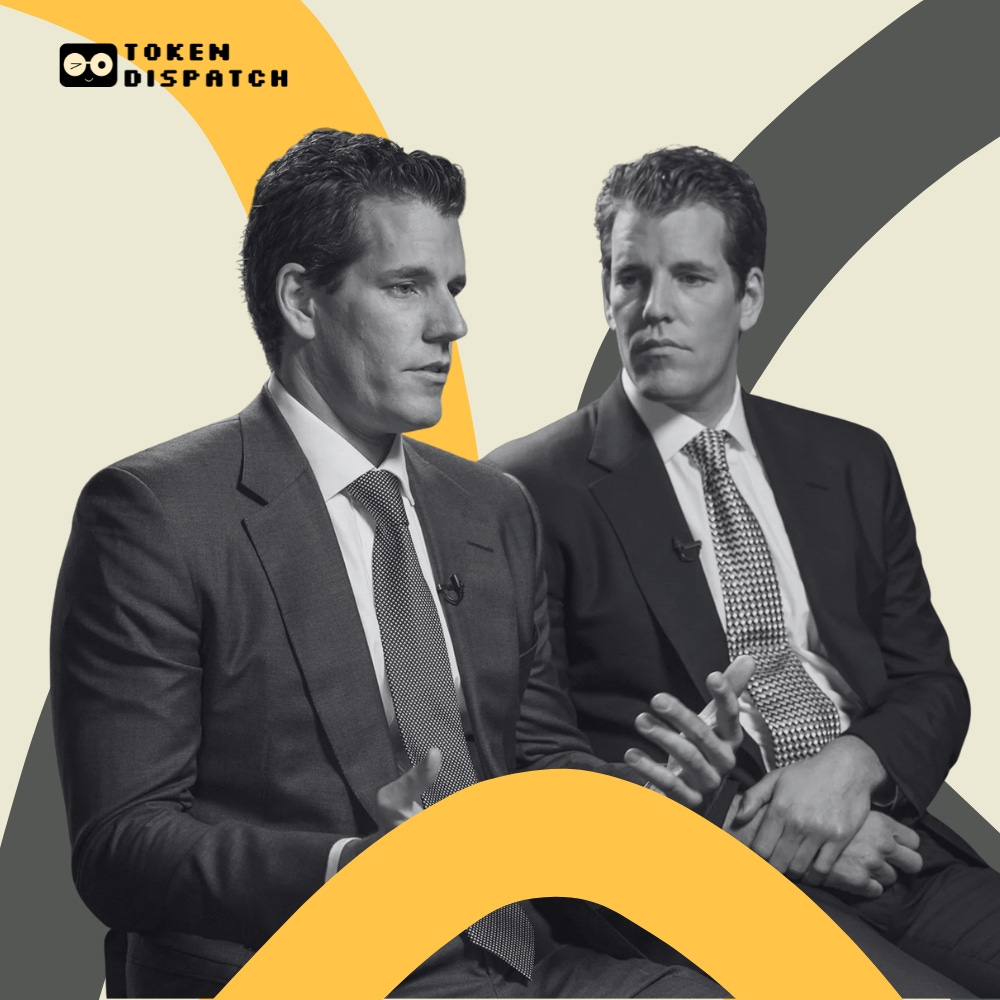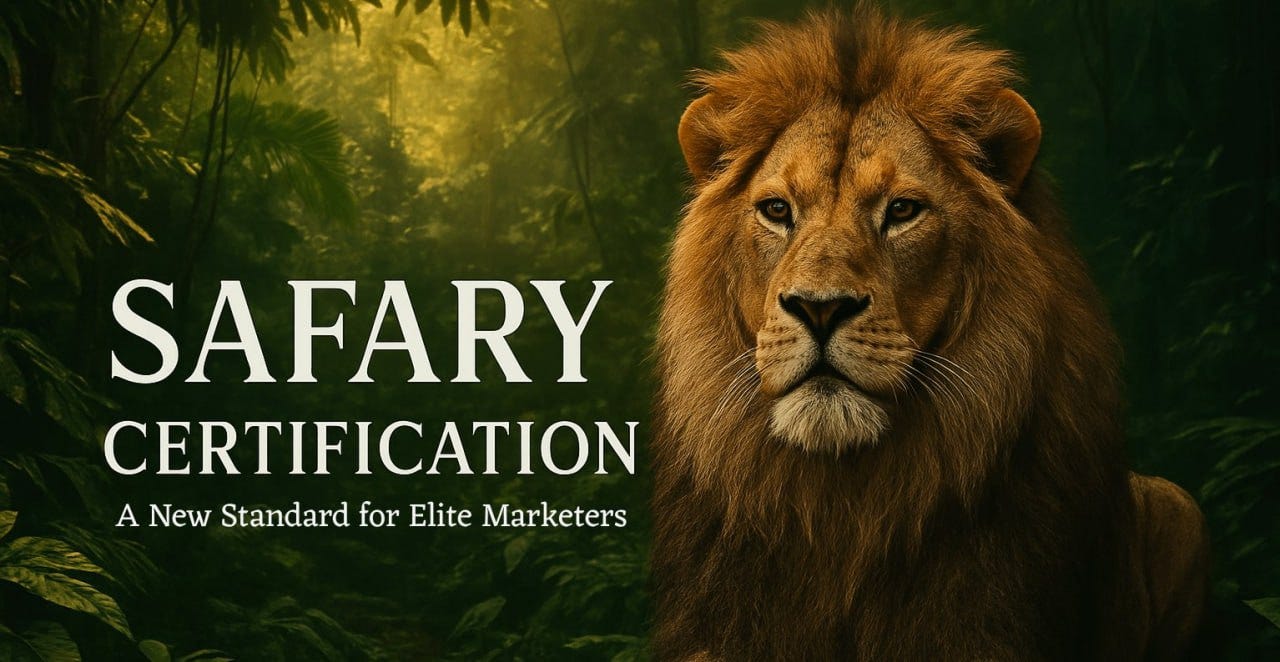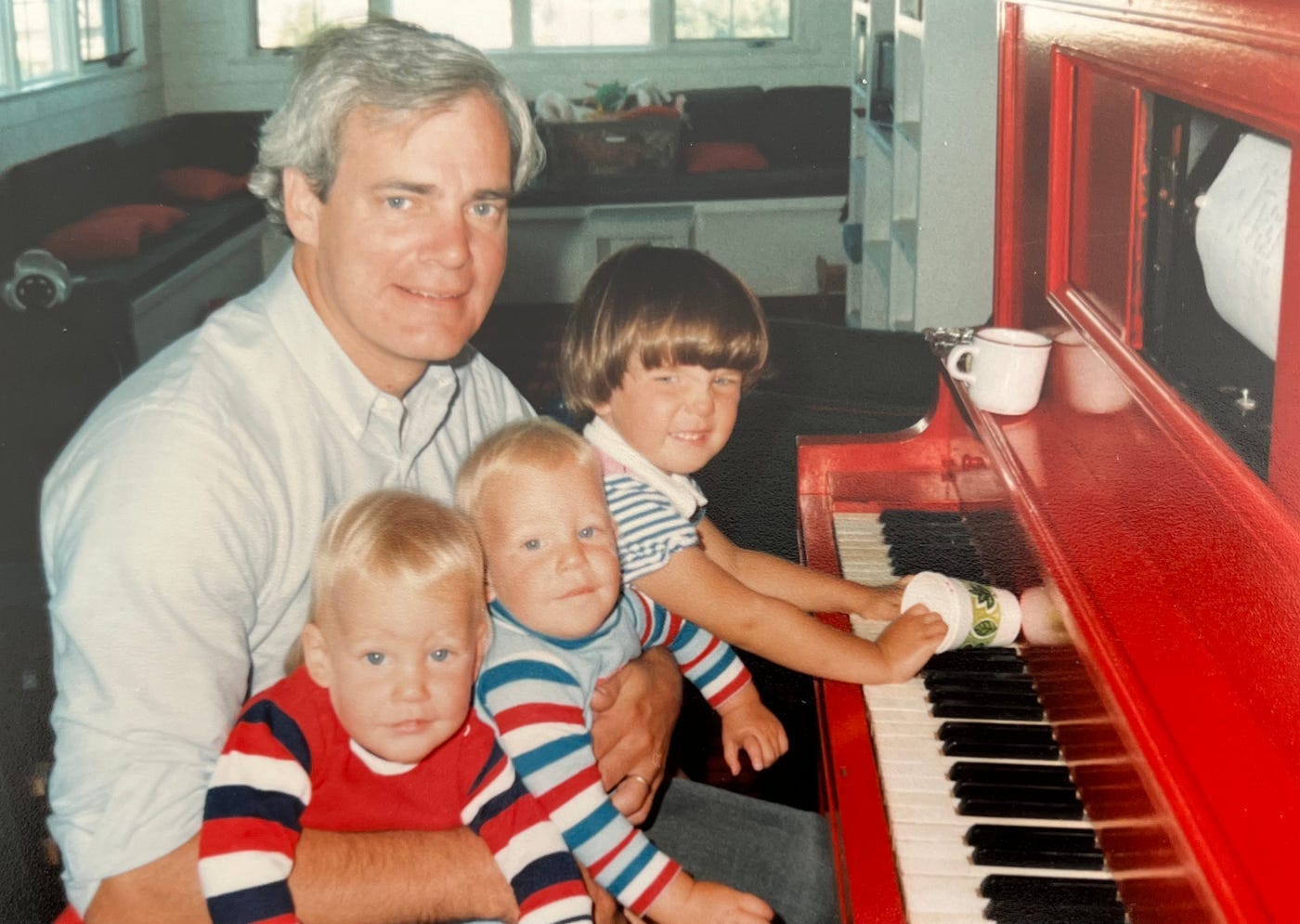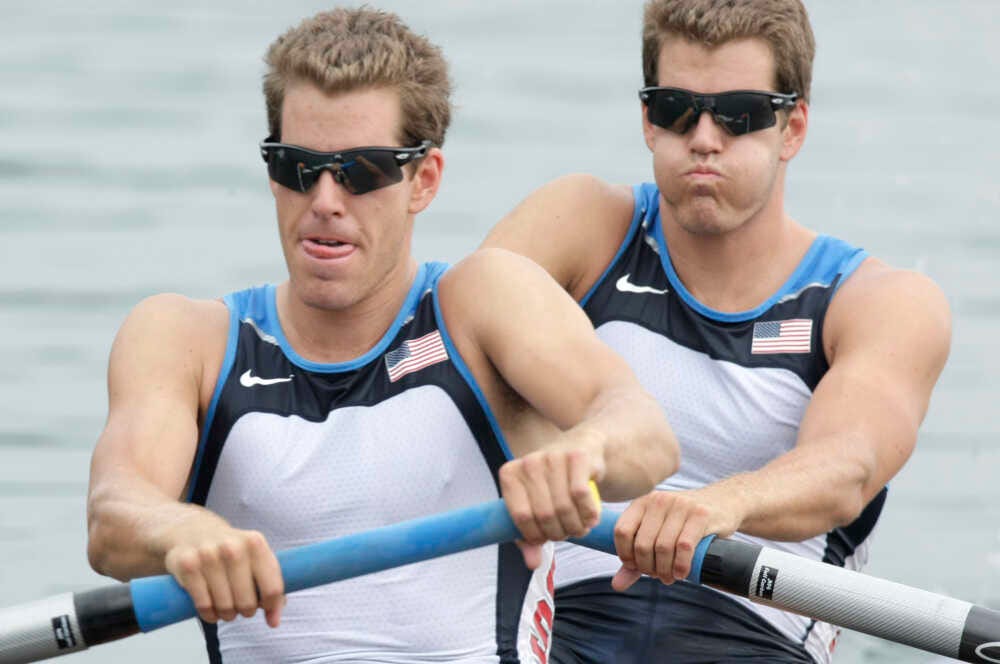The Winklevoss Brothers: Two Decisions That Changed Everything 👬🏻
February 2008. A conference room in San Francisco.
The mediator has just announced Facebook's settlement offer: $65 million. The room falls quiet. Mark Zuckerberg's lawyers wait for an answer.
Most people would take the cash and disappear. Tyler Winklevoss looks at his brother Cameron Winklevoss, then back across the table.
"We'll take it in stock."
The lawyers probably exchanged glances. Facebook was still private. The stock could tank. The company could fail. Cash was real. Stock was a gamble.
But Tyler's response would define the next decade of their lives. They were betting their entire settlement on a company that had, technically, stolen their idea.
When Facebook went public in 2012, their $45 million in stock became worth nearly $500 million.
The Winklevoss brothers had just pulled off one of the most audacious moves in Silicon Valley history. They'd lost the battle for Facebook, then made more money from Facebook than most early employees.
In 2013, they would do it again. Finding the opportunity at the right time.
Build the Skillset Crypto Teams Are Hiring For
Safary Certification is a 4‑week bootcamp taught by the very people behind growth at Kraken, Stargate, EigenLayer, and others.
In this bootcamp, you’ll learn:
How to position a crypto brand using narrative-first frameworks.
Funnel-building from acquisition to retention using onchain data.
Partnership strategies & token launch playbooks.
Building a personal brand that gets you hired in web3 growth.
Cohort 1 had 170 students. Cohort 2 kicks off August 1 with only 100 seats.
The Making of Mirror Images
Before they were crypto billionaires or Facebook litigants, Cameron and Tyler Winklevoss were mirror images of each other, literally.
Born August 21, 1981, in Greenwich, Connecticut, they were identical twins with one crucial difference: Cameron was left-handed, Tyler right-handed. Perfect symmetry.
They grew up tall, athletic, and eerily synchronised. At 13 they were teaching themselves HTML and building websites for local businesses. They founded their first web company as teenagers, creating sites for anyone willing to pay.
At Greenwich Country Day School and later Brunswick School, they discovered competitive rowing and co-founded their school's crew program.
In an eight-person shell, timing is everything. Be a fraction of a second off, and you lose. Perfect coordination requires reading your teammates, reading the water, and making split-second decisions under pressure.
They got good. Really good. Good enough to row at Harvard. Good enough to compete in the Olympics.
But rowing taught them something more valuable than athletic glory and it's the art of perfect timing and seamless cooperation.
The Harvard Laboratory
2000. The Winklevoss twins arrived at Harvard as economics majors with Olympic aspirations.
Cameron joined the men's varsity crew, the exclusive Porcellian Club, and the Hasty Pudding Club. Both brothers dedicated themselves to competitive rowing with an intensity that would carry them to international competition.
In 2004, they helped Harvard's crew nicknamed the "God Squad" achieve an undefeated collegiate racing season. They won the Eastern Sprints, the Intercollegiate Rowing Association Championship, and the legendary Harvard-Yale Regatta.
But one important discovery happened off the water.
December 2002. Junior year. The twins were studying the social dynamics of elite university life when they conceived HarvardConnection, later renamed ConnectU.
The idea was to create an exclusive social network for college students, starting with Harvard and expanding to other elite universities. They understood something fundamental about their generation, that is, students wanted to connect digitally, but existing tools were clunky and generic.
There was just one problem. They were athletes and economics majors, not programmers.
They needed help. They needed someone smart. Someone who understood their vision.
Enter Mark Zuckerberg.
October 2003. Harvard's Kirkland dining hall.
The twins approached Mark Zuckerberg with their social networking idea. Sophomore. Computer science major. Rumoured to be building something called Facemash where students could rate each other's photos.
Perfect.
They laid out their vision for HarvardConnection. Zuckerberg listened. Nodded. Asked questions about features and technical specifications. He seemed genuinely interested. They scheduled follow-up meetings.
For weeks, everything proceeded normally. Zuckerberg engaged with their ideas, discussed implementation details, and appeared committed to the project. The twins thought they'd found their programmer.
January 11, 2004. While the twins waited for their next scheduled meeting with Zuckerberg, he registered a domain name: thefacebook.com.
Four days later, instead of meeting with them, he launched Facebook.
The twins discovered their programmer had become their competitor when they opened The Harvard Crimson and read about it in the campus newspaper. The twins realised they'd been played.
The Legal War
2004. ConnectU sued Facebook, alleging Zuckerberg had stolen their idea, broken oral contracts, and used their concepts to build his competing platform.
Four years of legal warfare followed. Lawyers multiplied. The case became a sensation. But the lawsuit gave the twins a front-row seat to one of the biggest technological shifts in human history.
During the legal battle, they watched Facebook explode across college campuses, then expand to high schools, then open to everyone. The platform they'd envisioned was conquering the world, just with someone else's name on it.
They studied Facebook's user growth. They analysed its business model. They observed its network effects. By the time they reached the settlement table in 2008, they understood Facebook better than almost anyone outside the company itself.
But their biggest competition was happening in courtrooms, not on water.
The twins' decision to take Facebook stock over cash in their 2008 settlement proved prescient. When Facebook went public in 2012, their $45 million in stock had grown to nearly $500 million.
They'd just demonstrated that “The Winkleviis” could lose a battle and still win the war.
Their athletic careers continued alongside the legal drama. At the 2007 Pan American Games in Rio, Cameron won gold in the men's eight and silver in the men's coxless four. The following year, both brothers competed in the Beijing Olympics, finishing sixth in the men's coxless pair, which placed them among the world's elite rowers.
The Bitcoin Revelation
After their Facebook windfall, the twins tried becoming Silicon Valley angel investors. But every startup turned them down. The reason? Mark Zuckerberg would never buy companies the Winklevoss twins were involved with. Their money had become toxic.
Devastated, they escaped to Ibiza. One night in a club, a stranger named David Azar approached them with a dollar bill and said: "A revolution."
Standing on a beach, David explained Bitcoin. Digital money, completely decentralised, only 21 million would ever exist. The twins had never heard of it. Almost nobody had it in 2012.
As Harvard economics majors, they recognised Bitcoin's potential: digital gold with all the properties that made gold valuable throughout history, but better.
2013. While Wall Street was still figuring out what cryptocurrency was, the Winklevoss twins were loading up.
They invested $11 million when Bitcoin was trading at $100. At the time, this represented roughly 1% of all Bitcoin in existence, about 100,000 coins.
Think about this for a second. These were Olympic athletes. Harvard graduates. People with everything to lose. And they were betting millions on digital coins that most people associated with drug dealers and anarchists.
Their friends must have thought they'd lost their minds.
But the twins had watched a dorm room idea become worth hundreds of billions. They understood how quickly the impossible could become inevitable.
Their analysis was that if Bitcoin succeeded in becoming a new form of money, early adopters would do extraordinarily well. If it failed, they could afford the loss.
When Bitcoin hit $20,000 in 2017, their $11 million had become worth over $1 billion. The twins had become the world's first confirmed Bitcoin billionaires.
The pattern was becoming clear. Cameron and Tyler Winklevoss could see around corners.
Building the Infrastructure
The twins didn't just buy Bitcoin and wait. They started building the infrastructure that would enable mass adoption.
Winklevoss Capital provided seed funding to startups building the rails for the new digital economy: exchanges (like BitInstant), blockchain infrastructure, custody tools, analytics platforms, and later, DeFi and NFT projects. Their investment portfolio has spanned everything from protocol developers (such as Protocol Labs and Filecoin) to energy infrastructure for crypto mining.
2013. The twins filed the first Bitcoin ETF application with the SEC. It was a moonshot that almost certainly would fail, but someone had to go first. The Securities and Exchange Commission rejected their application in March 2017, citing concerns about market manipulation. They tried again. Rejected again in July 2018. But their regulatory groundwork established precedents that other applicants could build on. When spot Bitcoin ETFs were finally approved in January 2024, it represented the culmination of frameworks the twins had begun developing over a decade earlier.
In 2014, BitInstant CEO, Charlie Shrem was arrested at an airport for money laundering connected to Silk Road transactions. BitInstant shut down. The main Bitcoin exchange, Mt. Gox was hacked and lost 800,000 Bitcoin. The infrastructure the twins had invested in was crumbling - Bitcoin was trembling.
But they saw opportunity in the chaos. The Bitcoin ecosystem needed legitimate, regulated companies.
2014: They founded Gemini, one of the first regulated cryptocurrency exchanges in America. While other crypto platforms operated in legal gray areas, Gemini worked directly with New York state regulators to establish clear compliance frameworks.
They understood that for cryptocurrency to go mainstream, it needed institutional-grade infrastructure. The New York State Department of Financial Services granted Gemini a limited purpose trust charter, making it one of the first licensed Bitcoin exchanges in the US.
By 2021, Gemini was valued at $7.1 billion with the twins maintaining at least 75% ownership. Today, the exchange holds over $10 billion in total assets and supports more than 80 cryptocurrencies.
Through Winklevoss Capital, they invested in 23 cryptocurrency projects, including Protocol Labs and participating in the Filecoin fundraising round in 2017.
Instead of fighting authorities, the Winkleviis worked to educate them. Instead of seeking regulatory arbitrage, they built compliance into their products from day one.
Gemini faced challenges including a $2.18 billion settlement over its Earn program in 2024. But the exchange survived and continued operating.
The twins understood that technology alone wasn't enough. Regulatory acceptance would determine cryptocurrency's fate.
2024: They each donated $1 million in Bitcoin to Donald Trump's presidential campaign, positioning themselves as advocates for crypto-friendly political leadership. Their donations exceeded federal contribution limits and had to be partially refunded, but they'd made their point.
The twins have been vocal critics of what they perceive as the SEC's overly aggressive enforcement approach under Chairman Gary Gensler. Their regulatory battles became both personal and professional, with the SEC's lawsuit against Gemini representing a direct challenge to their business model and in June 2025, Gemini confidentially filed for an IPO.
The Current Score
Forbes currently values each brother at $4.4 billion, for a combined net worth of ~$9 billion, with Bitcoin holdings constituting the largest portion of their wealth.
Their cryptocurrency holdings include an estimated 70,000 Bitcoin worth $4.48 billion, plus significant positions in Ethereum, Filecoin, and other digital assets.
Gemini remains one of the most trusted cryptocurrency exchanges globally, with institutional-grade security features and regulatory compliance. The exchange's pending IPO filing represents a significant step toward mainstream financial market integration.
February 2025. The twins became part-owners of Real Bedford Football Club, investing $4.5 million in the English football club that competes in the eighth tier of the league system.
Working with cryptocurrency podcaster Peter McCormack, they're attempting to elevate a semi-professional team toward the Premier League. Their father Howard made his own statement in 2024, donating $4 million in Bitcoin to Grove City College—the first Bitcoin gift the school had ever received and will fund the newly named Winklevoss School of Business.
The twins themselves donated $10 million to Greenwich Country Day School, the largest alumni gift in the school's history.
The twins have publicly stated they would not sell their Bitcoin holdings even if the cryptocurrency reached the market capitalisation of gold, demonstrating their belief that Bitcoin represents not just a store of value, but a fundamental reimagining of money itself.
The Harvard Crimson newspaper that revealed Mark Zuckerberg's betrayal. A dollar bill on an Ibiza beach that sparked a revolution—two moments, before and after they learned to see what others couldn't. Cameron and Tyler Winklevoss spent years being told they were too late to the party. Turns out, they were just early to the next one.
See ya next Tuesday with another interesting profile.
Until then …stay curious,
Thejaswini
Token Dispatch is a daily crypto newsletter handpicked and crafted with love by human bots. If you want to reach out to 200,000+ subscriber community of the Token Dispatch, you can explore the partnership opportunities with us 🙌
📩 Fill out this form to submit your details and book a meeting with us directly.
Disclaimer: This newsletter contains analysis and opinions of the author. Content is for informational purposes only, not financial advice. Trading crypto involves substantial risk - your capital is at risk. Do your own research.








